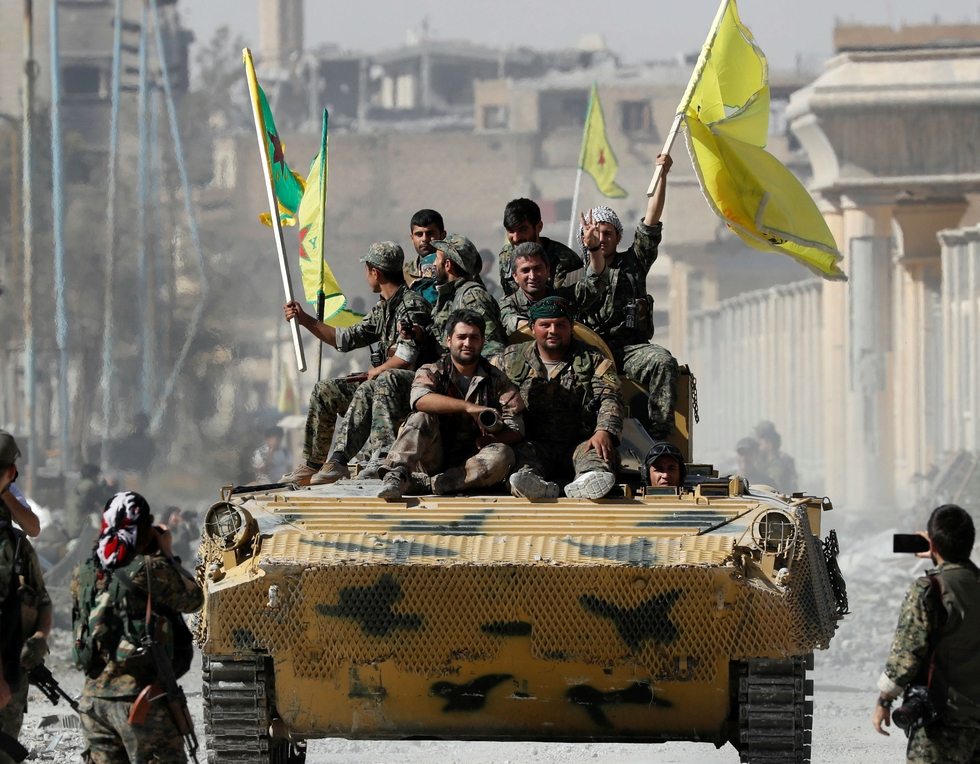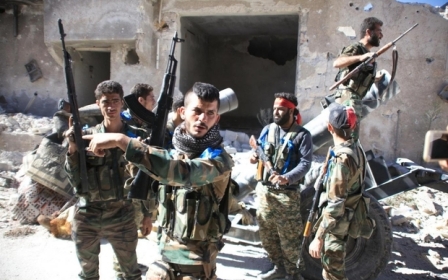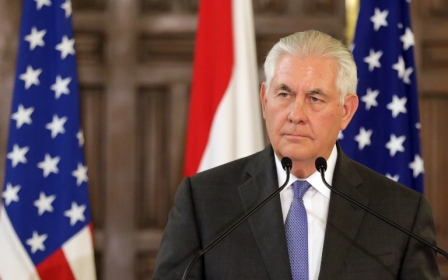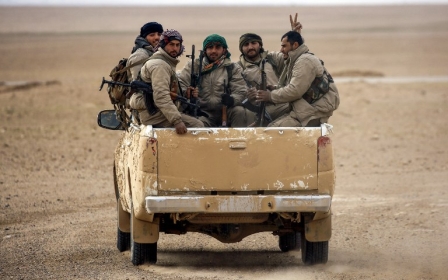US commanders recommend letting Kurdish fighters in Syria keep weapons

US commanders planning for the withdrawal of their troops from Syria are recommending that Kurdish fighters battling Islamic State (IS) be allowed to keep US-supplied weapons, four American officials have said, a move that would likely anger NATO ally Turkey.
Three of the officials, speaking on condition of anonymity, said the recommendations were part of discussions on a draft plan by the US military.
The US told the Kurdish People's Protection Units (YPG) that they would be armed by Washington until the fight against IS was completed, one of the US officials said.
"The fight isn't over. We can't simply start asking for the weapons back," an official told the Reuters news agency.
The proposal to leave US-supplied weapons with the YPG, which could include anti-tank missiles, armoured vehicles and mortars, would reassure Kurdish allies that they were not being abandoned.
Ankara which views the YPG as an extension of a Kurdish insurgency inside Turkey, has threatened to launch an offensive against the YPG, raising fears of a surge in violence that could harm hundreds of thousands of civilians.
Turkey wants the US to take the weapons back, so the commanders' recommendation, if confirmed, could complicate Trump's plan to allow Ankara to finish off the fight against IS inside Syria.
The Pentagon keeps records of the weapons it has supplied to the YPG and their chain of custody. But, the US officials said, it would be nearly impossible to locate all of the equipment.
"How are we going to get them back and who is going to take them back?" one of the officials asked.
Turkish-Russian coordination
The report came as Russia and Turkey agreed on Saturday to coordinate ground operations in Syria after last week's shock announcement of the US military withdrawal from the country.
"Of course we paid special attention to new circumstances which appeared in connection with the announced US military pullout," Russian Foreign Minister Sergei Lavrov said after talks with his Turkish counterpart Mevlut Cavusoglu in Moscow.
The idea that we'd be able to recover them [the weapons] is asinine. So we leave them where they are
- US official
"An understanding was reached of how military representatives of Russia and Turkey will continue to coordinate their steps on the ground under new conditions with a view to finally rooting out terrorist threats in Syria," Lavrov said.
Cavusoglu confirmed the two countries would coordinate Syria operations, adding they also discussed plans to help refugees to return home.
"We will continue active work [and] coordination with our Russian colleagues and colleagues from Iran to speed up the arrival of a political settlement in the Syrian Republic," he said in remarks translated into Russian.
On Friday, Syrian government forces said they have entered Manbij in the north of the country after an appeal from the YPG to take control of the city, though this was denied by local residents and the US military operating in the area.
The YPG said they had invited President Bashar al-Assad's forces into the flashpoint city to ward off an impending Turkish assault.
Turkey denounced the move while Russia described it as "a positive trend".
US betrayal
Trump's abrupt announcement of the complete withdrawal of US troops from Syria drew widespread criticism and prompted US Defence Secretary James Mattis's resignation.
US officials said Trump's decision has upset US commanders, who view his decision as a betrayal of the Kurdish YPG militia, which has led the fight to eradicate IS from northeastern Syria.
In May 2017, the US started distributing arms and equipment to the YPG for an offensive against Raqqa, the de facto capital of the self-declared caliphate that Islamic State overran in Iraq and Syria in 2014.
The US told Turkey that it would take back the weapons after the defeat of Islamic State, which has lost all but a few slivers of territory in northeastern Syria.
"The idea that we'd be able to recover them is asinine. So we leave them where they are," said a US official.
Turkey has said weapons supplied to the YPG have in the past ended up in the hands of its Kurdish separatists, and described any weapon given to the insurgents as a threat to Turkey's security.
'Rejection of Trump's policy'
It is unclear what the Pentagon will ultimately recommend to the White House regarding the US commanders' advice, Reuters said.
Discussions are still at an early stage inside the Pentagon and no decision has yet been made, the officials said.
The plan will then be presented to the White House in the coming days with Trump making the final decision.
The Pentagon said it would be "inappropriate" and premature to comment on what will happen with the weapons.
"Planning is ongoing, and focused on executing a deliberate and controlled withdrawal of forces while taking all measures possible to ensure our troops' safety," said Commander Sean Robertson, a Pentagon spokesman.
The White House did not comment.
A person familiar with the discussions of the US withdrawal plan said the White House and Turkish President Recep Tayyip Erdogan would oppose the proposal to allow the YPG to keep its US-supplied weapons.
The recommendation "is a rejection of Trump's policy to withdraw from Syria," said the person, who asked not to be further identified.
The debate over whether to leave weapons with the YPG coincides with Trump's national security adviser John Bolton's visit to Turkey and Israel next week for talks on Syria.
New MEE newsletter: Jerusalem Dispatch
Sign up to get the latest insights and analysis on Israel-Palestine, alongside Turkey Unpacked and other MEE newsletters
Middle East Eye delivers independent and unrivalled coverage and analysis of the Middle East, North Africa and beyond. To learn more about republishing this content and the associated fees, please fill out this form. More about MEE can be found here.




